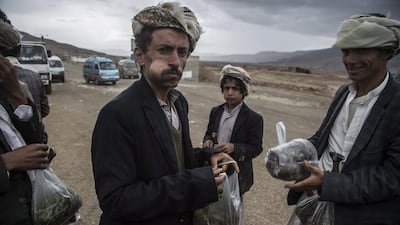TAEZ // Anwar Essa once led a comfortable life. He had a good job as a nurse in a private hospital and lived in Taez city with his wife and parents.
Unlike most Yemeni men, the 30-year-old was not in the habit of chewing qat, the mild narcotic herb that is popular in countries around the Red Sea and Horn of Arica.
But the pressures of war, grief and depression turned him into a hardened addict two years ago.
Chewing qat is a tradition in the Arabian Peninsula and the Horn of Africa that can be traced back thousands of years, and according to the World Health Organisation, an estimated 90 per cent of Yemeni men chew it three to four hours each day.
Qat seller Osama Mansour, who is in his 40s, has been been in the business for 20 years. He said he had never sold as much qat as he did in the past two years.
"When the war broke out, I thought I would be out of a job as people would not be able to buy qat anymore," Mr Mansour told The National.
“I was shocked by the high quantity of qat which we sold,” he said. “I am not happy about the bad situation in my country but I cannot deny that it has brought some benefit to us qat sellers.”
Anwar’s descent into addiction began when his cousin Esam, then 28, was killed by a stray bullet in February 2015, during civilian clashes in a Taez market.
The two young men were very close and Anwar was grief-stricken.
“I looked for things to help me forget my grief,” he said. “I never chewed qat before because I thought it was a waste of time and money and used to try and make my brother give up chewing qat. But I knew from him that it makes you feel happy, so I tried it.”
The Houthi rebels seized Sanaa from the government of president Abdrabu Mansur Hadi in September 2014. Six months later, a Saudi-led coalition entered the conflict to restore the legitimate government who had fled to Riyadh, and Taez got caught up in the thick of the fighting, overrun by the Iranian-backed rebels.
In May 2015, Anwar fled with his wife and two children to his native village of Bani Omar, some 30 kilometres from the city.
While he found safety there, he lost almost everything else.
“We were forced to leave everything behind as we had neither the time nor the money to ship our furniture. When we managed to get settled in my village, I found myself a poor man who could not support his family. I had no livelihood at all,” Anwar said.
“I lost my cousin whom I loved very much. Then I lost my job because we had to flee from the fighting in the city. I didn’t know anybody because I also left my friends and relatives.
“Qat was the only thing that made me feel happy. It was the only way I could escape from my situation into an imaginary life.”
The World Health Organisation has classified qat as a “drug of abuse that can produce mild to moderate psychological dependence”. Chewing qat can lead to physical symptoms such as hallucinations, depression and tooth decay. There are no statistics for the number of Yemenis chewing the mild stimulant, but it is not illegal to do so, and a bundle of the leaves can cost from US$1 (Dh3.67) to $100, depending on the quality.
Chewing qat has always been popular at social gatherings in Yemen such as weddings.
By the afternoon and for several hours each day, most Yemenis – usually men, although women chew it as as well – are usually seen with bulging cheeks full of the mashed up herb.
In May last year, the authorities in Aden banned the use of qat in the city on work days, allowing the sale of the drug only on Thursdays and Fridays – the Yemeni weekend. But the ban is no longer enforced.
Demand for the drug has remained high, and qat farmers are profiting from it.
Ahmed Gameel has seen his income rise since the war began. “During the last two years, we have pulled up our coffee bushes and planted qat instead because we can earn three times as much from qat than from other crops,” he said.
Anwar now feels he cannot function without qat, and accepts he is an addict.
“When I chew qat, I feel I could work as a manager of an institute and sometimes I make plans to work as a trader,” he said. “At that moment, I feel happy. But after a few hours my good mood disappears.”
foreign.desk@thenational.ae

